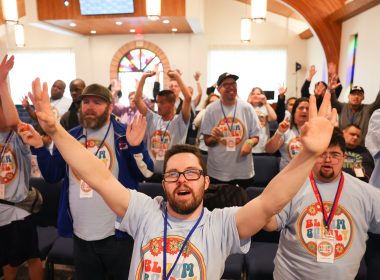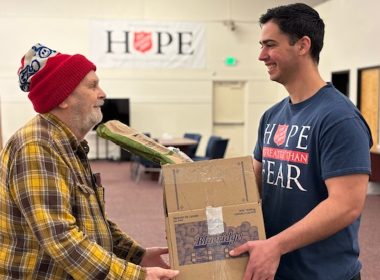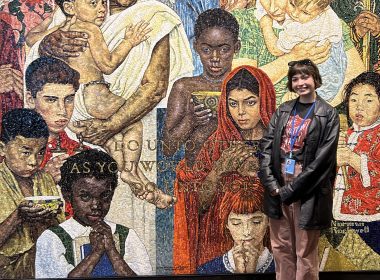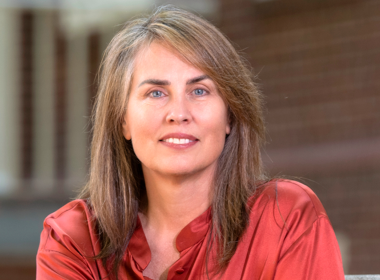San Francisco
Recovery Program Aids Homeless, Addicts This year, the San Francisco Harbor Light Center is the Western Territory’s nominee for the National Social Services Award for Program Excellence and Achievement.
Recognized as a model for other Army programs across the country, it has set a standard for developing social services to meet the needs of a diverse local community. It also provides a dynamic recovery environment which brings out the best in those who participate. Captains Lawrence and Victoria Shiroma are the center’s directors.
With a rise in the use of crack cocaine in the late 1980s, a focus of the program has been on a younger, more ethnically diverse population, less educated, and with few vocational skills to compete in today’s marketplace. They come primarily from poor, single parent families.
The AIDS epidemic and other social ills have complicated the problems that young men and women now bring to The Salvation Army. The center has risen to the challenge, opening its doors to all who can benefit from its detox and recovery programs. The Harbor Light program is based upon the teachings of Jesus Christ, of Christian love and compassion.
Changing treatment approaches with the newest research in the field, Harbor Light has stayed in the forefront of recovery methods. Captain Larry Shiroma, the administrator, has a Master of Social Work degree. He has contributed to the Western Territory’s Journal of Rehabilitation and Recovery, which serves to document the experience and expertise of the Army in the field of substance abuse treatment.
The high incidence of HIV/AIDS among the alcoholic and drug addicted population led the Army into a wider community collaboration than ever before. As a means of responding to the AIDS crisis, Harbor Light applied for city financial assistance. The Ryan White CARE Act funding for 10 people was followed with funding for CARE Detox to serve 14 more of this segment of the Harbor Light population. The Harbor Light staff committed themselves to providing the needed education and service to meet this crisis. A recent city program monitor reported, “Due to the staff’s dedication, compassion, and caring to go the extra mile, the detox unit exceeds all standards.”
Meets local needs
Harbor Light has set a standard for developing service to meet the needs of the local community. As an example, the “HARP” Homeless Alcohol Recovery Program is a primary care program which serves a segment of the city’s homeless population and those at risk of becoming homeless, who have experienced a continuing history of substance abuse.
Financed through Target Cities Project funds, the aim is to establish a basic framework for a clean and sober life. A change in attitudes, beliefs and behavior is encouraged through spiritual growth. As an added means of providing fully effective service, Harbor Light cooperates with many other community programs.
Recovery Programs for Women
In 1975, Harbor Light opened one of the first recovery programs for women with a grant from the Department of Public Health. With additional funding, a detoxification unit was added in 1978, followed in 1988 with a new 20-bed primary care/post detox unit.
Services include individual counseling, intensive educational and recovery-oriented group sessions, and HIV/AIDS education and health care coordination. There is a strong relapse prevention program.
Strong community linkage provides assurance of immediate response and the best of care. A visiting health team provides routine physical examinations and TB testing, and a cooperative network of service providers assists the Army in meeting a range of client needs.
Concern for All
While working primarily with the substance abuser population, the activities of the center reflect compassion and concern for all people. The Annual Holiday Meals Delivery Program is Christianity in action. Harbor Light program residents join staff and hundreds of volunteers to prepare and deliver over 5,000 meals to seniors and shut-ins on Thanksgiving and Christmas. In addition, the corps League of Mercy members deliver hundreds of holiday gifts to patients at San Francisco’s general hospital and convalescent homes.
The Harbor Light program has been in San Francisco since 1885, when it officially opened as the Third Street Corps #2, providing meals, shelter and services to the skid row population of homeless men. It became the Harbor Light in 1941 and in 1950 moved to a 28-bed facility. At its present location in the South of Market area since 1972, the program began to contract with the City and County of San Francisco for treatment services, enabling it to expand.
That same year, a 100-bed hotel was purchased in the city’s Tenderloin District to provide a sober living environment for graduates of recovery programs. Bridgeway remains as an Army facility, along with Lifeboat Lodge, a 56-bed men’s shelter under separate corps administration.
Spiritual Support System
Lighthouse Corps was then designated as a special recovery corps at the Harbor Light Center, maintaining the Army’s balanced ministry. The corps’ purpose is to spread the gospel of Jesus Christ to the unconverted, specifically men and women in recovery.
Lighthouse is a spiritual support system for the residents and their families, not only while in the program, but when they are living independently. Average attendance at Sunday worship service is 90. The majority of 31 soldiers and 11 adherents are Harbor Light graduates, with steady growth reported in each corps review.
Harbor Light was one of the first in the Western Territory to initiate a no-smoking policy, supporting staff and clients alike in this challenge. Nicotine Anonymous groups are now held regularly at the center.
The Salvation Army’s contribution to the field of drug and alcohol treatment has been substantial in this country, and has established a reputation for high quality service. In a field where relapse is very high, an impressive 33 percent of the clients maintain sobriety after one year of completing the program.







